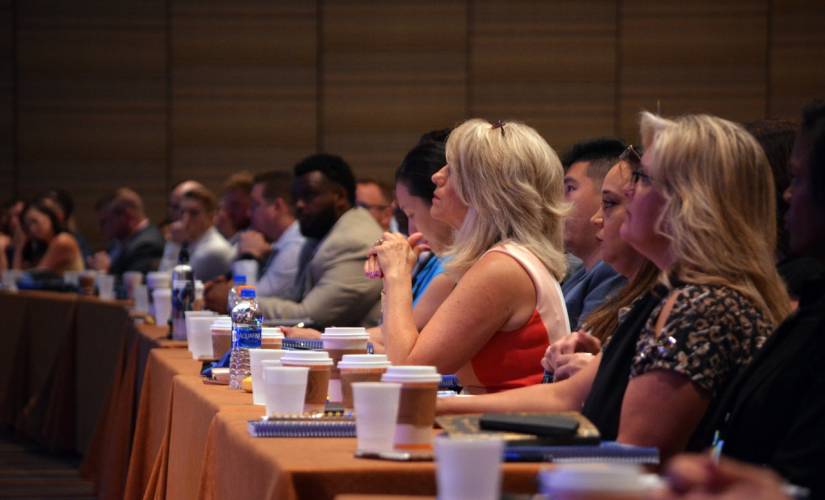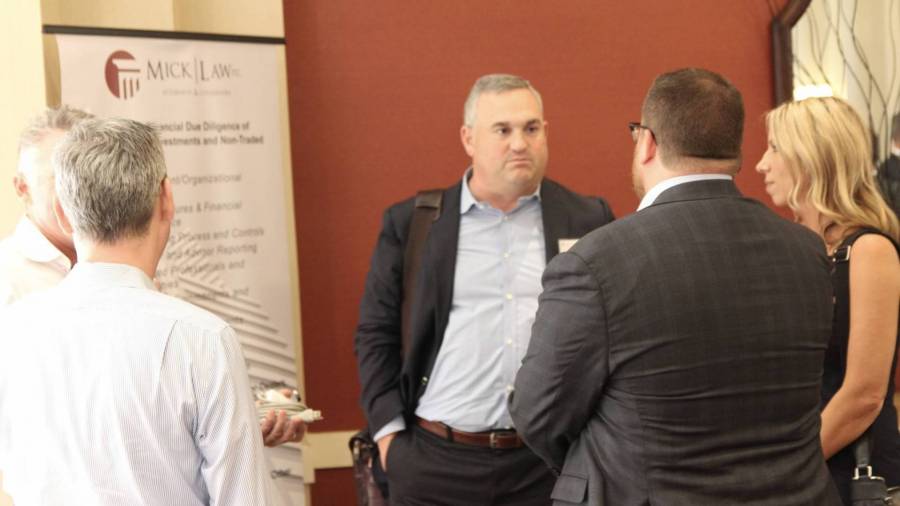An important part of honing our skills as business professionals is becoming better at meeting new people and building real relationships. The more we invest in practicing engaging with others effectively — the more natural our ability to build relationships, becomes. We then look forward to the process of building relationships and find genuine happiness in the process. Our opportunity set in life is a function of both what we know and who we know. And although we meet people everywhere we go, conferences afford a unique opportunity to change the “who we know” forever.
Timeless Tips for Connecting and Building Relationships at Conferences
We attend many events to acquire knowledge while fostering new connections. And because we’re all there for the same reason — to learn about new things and establish new relationships. We realize that these relationships could develop into long-term friendships or potential business partnerships.
Attending events
Attending events is the type of gathering that affords us the opportunity to make contacts easier. Although many conferences have gone virtual or been postponed due to the pandemic, it is more important than ever to attend these events now — and to build connections successfully.
Attending events now will entail both adapting to the “new normal” of socially distanced networking, in the short term, and preparing for an enthusiastic return to many new additional in-person networking in the long term.
Benefits of the connections
We don’t always see the real benefit of the connections we make at conferences right away. They must first be nurtured into meaningful relationships, and to do this successfully; we need a plan. Such relationships are gradually built through purposeful, patient, and authentic follow-up. An effective follow-up depends on the information you gather and the energy you invest to represent best who you are.
Authentic follow-ups
Authentic follow-up can help you stand out from the crowd because the “crowd” typically defaults to the easiest and sadly, least effective means of building relationships.
After you meet someone at a conference, one of two things happens: (1) You never hear from that person again, or (2) you receive a generic email or LinkedIn message saying something to the effect of, “It was nice meeting you at the conference. Let’s stay in touch,” perhaps with a link to a website.
If you have ever been guilty of either of these (as I have), establishing an action plan for new contacts will help you avoid repeating this common mistake. And the first step is preparation.
Set your specific goal before the conference
Before attending a conference, set some specific goals for yourself concerning the types of contacts you would like to make. Create a follow-up plan (before you go) for how you may be able to work with or help both the qualified contacts you meet and the less-than-ideal ones.
Remember that even though a person may not be an ideal contact for you, they may know someone else who is.
Furthermore, the most helpful and mutually beneficial relationships you establish might not be immediately obvious. You may need to have several meetings or conversations with an individual to discover your shared foundation of interest and opportunity.
For example, my colleague Sameer Somal at Blue Ocean Global Technology once met the head of sales for a financial services firm he introduced to others — but Sameer assumed that the new contact was not likely to work with our company directly. However, much later the new contact learned how Blue Ocean assists organizations in building a digital presence that supports sustainable sales growth.
The new contact connected back with Sameer and with the owner of his firm. The new contact included a strong written recommendation for hiring Blue Ocean Global Technology to create and implement a plan for better allocating their marketing, sales, and technology resources. Win-win for all of us.
Getting the most out of connecting, networking and building your relationships at your next conference or event.
-
Focus on Connecting.
During your initial conversations with people, really focus on them. When you give people your full attention, you make them feel important, and that may be the greatest gift of all between two human beings. Also, when people feel they’re truly being heard, they will talk more easily about themselves, their jobs, their passions, and their business.
Face them directly to avoid being distracted by the activity around you and lean toward them slightly. Take care not to invade their personal space. If you’re in a crowded hallway or other noisy location, suggest moving to another area, perhaps an alcove or a quieter corner of the room so that you can engage with fewer distractions.
And when you meet someone new and they are speaking — resist the urge to look around to see who else is in the room or what else is going on. Just don’t — looking around indirectly tells the person you don’t really care about what they’re saying and can create an unfavorable first impression (about you) that might be difficult to recover from.
Alex Jenkins, Relationship Director and Investment Specialist at Avantis Investors, make a conscious effort to avoid the topic of business when he meets someone for the first time. If the other person chooses to discuss professional interests or work matters, Alex will join in, but he never proactively steers the conversation in that direction.
By avoiding direct mention of business, Alex shows that he is interested in who that person is rather than simply what they do.
Paying close attention to your new contacts will help you learn what is important to them at that moment or in their life in general. Besides sharing potentially valuable business information, they might mention their favorite sports team, reference a movie they enjoy or disclose something personal about a loved one.
Focusing on your new acquaintance builds trust. Treat these individuals as though they’re the source of the most satisfying business relationship you’ll ever have because they just might be.
-
Record Important Details.
Be prepared to gather details beyond a person’s basic contact information, and either take notes during your conversations or jot down your primary takeaways immediately after speaking with them.
Consider using the note feature on your phone or a small notebook that fits in your pocket so that the information is all in one place. At the very least, make notes on the back of the business cards you collect or use a recorder app on your smartphone.
Don’t expect to simply remember details. No matter how fascinating a conversation may be, we are bound to start forgetting key bits of information as soon as the next exciting conversation begins. Always take a few minutes to process and document some of the critical points from your initial conversation with a new contact.
-
Listen to Learn.
When someone shares information with you about themselves, respond by acknowledging it with a related comment or question. Don’t just move on to the next topic you have in mind.
Providing others with positive feedback builds rapport, which in turn leads to trust. And the information you gather might prove useful in follow-up conversations.
Let’s say the individual mentions a new product launch for their business. You could ask them how they feel about the product or how it’s different from the business’s other offerings. Your response could be as simple as, “Thank you for sharing. Tell me more about that.” Their replies will help you understand what is most important to them, and knowing what’s important to them is a cornerstone in building your relationship.
“When you remember a specific part of someone’s story that they told you and relay it back to them in a question such as, ‘How did your big pitch go last week?’ in a follow-up email, people will want to grow the relationship,” says John Livesay, author of Better Selling Through Storytelling.
-
Define Your Relationship.
Consider why each new contact is interested in speaking with you.
Ask them what type of person they’re hoping to meet at the conference. Perhaps you are that person. But if not, offer to introduce them to someone in your network who might be a good match. Ideally, this will engage what’s known as the Law of Reciprocity, meaning they will feel somewhat obligated to return the favor.
You’ve now expanded your reach at the conference. (Conversely, this may also help you identify “takers,” those with little or no interest in genuinely helping you, no matter how much you help them.)
If appropriate, exchange business phone numbers so you can quickly contact each other if and when you encounter another person they should meet, and vice versa.
-
Learn Their Preferences.
Ask each new person you meet how they wish to be contacted. Some might be swamped with email and would prefer a phone call. Others may favor a quick text message to arrange a time for a call or meeting. Your goal is to connect with them simultaneously and in a fashion that would make them most receptive to you.
Respecting their wishes demonstrates your desire to cultivate an authentic relationship with them—at their convenience—and can highlight how you are different.
-
Focus on Qualified Contacts.
Go for quality over quantity. Returning from a conference with hundreds of new contacts doesn’t necessarily make you a winner. The value lies in the number of qualified contacts you make. Interact and invest time with as many people as you will realistically be able to follow up with later.
I used to follow up with everyone in the same way, and that was exhausting. Seek out individuals who seem most qualified to do business with you directly or who might be instrumental in facilitating another relationship that could be beneficial.
Work your usual business qualifying questions into your conversations. Who knows? You might be speaking with an ideal, potential, client who presents a need your business can resolve and can generate new business sooner rather than later.
“The most qualified relationships are those in which you enter into with an open mind, wanting to learn from others. As successful philanthropists often say, the act of volunteering is selfish because it makes us feel good. As such, connecting with people should also be about what you can gain from them. What you receive from others is of more value than what you could possibly exude.” —Marie Beane, Director of IBM Worldwide Storage.
-
Schedule Your Follow-up.
Effectively following up with people takes time, so before you even leave for a conference, schedule opportunities in your calendar during the week immediately after your event, in which to reach out to your new contacts.
Otherwise, you risk falling back into your regular routine and neglecting or postponing this important step in the relationship-building process. Those generic messages I mentioned earlier are often the result of not setting aside the necessary time to follow up.
Although mediocre businesspeople will follow up poorly and feel satisfied that they at least did something — that’s not how truly successful business professionals operate.
When carefully managed, your initial contacts with people at conferences can sow the seeds for fruitful business relationships in the future.
Recognize that strong connections aren’t built in just a few minutes or even a day, though, so your follow-up plan is key.
To set the stage for success, empower yourself with valuable information by being attentive to details, incorporating those details into your subsequent communications, and seeking to nurture positive associations for everyone involved.
Internal Post Image Credit: provided by the author; thank you!
Top Image Credit: antonio jamal roberson; pexels; thank you!







